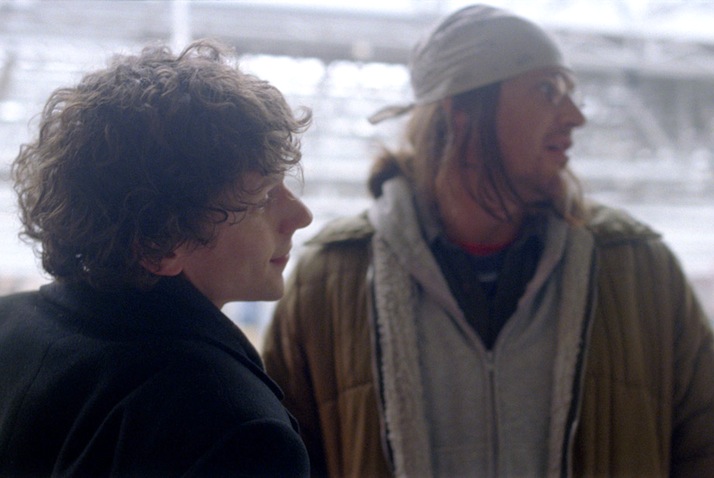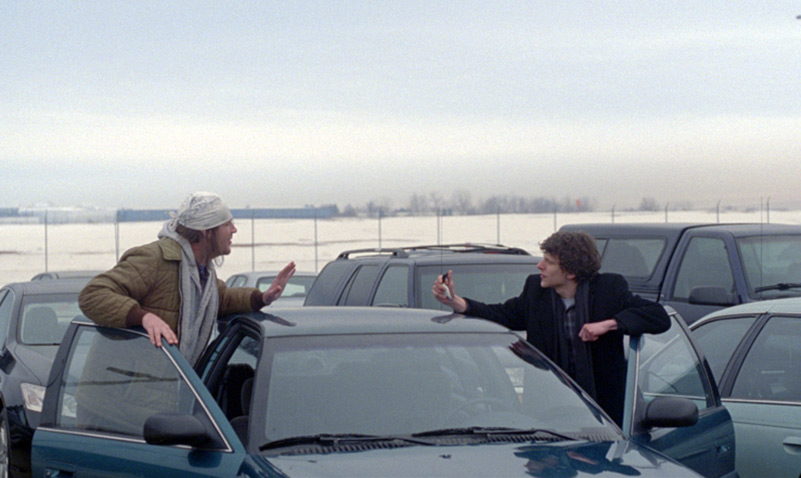By providing your information, you agree to our Terms of Use and our Privacy Policy. We use vendors that may also process your information to help provide our services. This site is protected by reCAPTCHA Enterprise and the Google Privacy Policy and Terms of Service apply.
Jason Segel on Why He Wants ‘The End of the Tour’ Audiences to Forget They’re Watching Him Onscreen
Charles Bramesco

READ MORE: James Ponsoldt on Why ‘The End of the Tour’ Is Not a David Foster Wallace Biopic
David Foster Wallace is not the sort of role that an actor takes lightly. When Jason Segel (known primarily as the self-effacing funnyman who starred in Apatow joints “Forgetting Sarah Marshall” and “I Love You, Man” as well as happily married Marshall on ubersitcom “How I Met Your Mother”) signed on to portray the celebrated writer in James Ponsoldt’s “The End Of The Tour,” he exercised due diligence. The result was a performance of unanticipated nuance and power, uncannily replicating the Wallace preserved in interview clips and writing samples while also unearthing hidden depths of personality that only a premise this intimate could afford.
Indiewire had the opportunity to sit down with Segel to discuss the state of the profile-interview, the experience of reading “Infinite Jest” and the estimable pleasures of simple entertainment.
Has appearing in “The End Of The Tour,” which is largely about the dynamic between the interviewer and the subject, changed your perspective on interactions like the one we’re having right now?
In today’s world, with the Internet especially, anyone who’s dealt with being interviewed frequently is acutely aware that— [pauses] The Internet is like the wild west. You can write a headline with a question mark, and you’re pretty much allowed to say anything.
There’s no set of rules.
Absolutely no set of rules, not in terms of how much research needs to be done before you print. One day in, David Foster Wallace realizes that this guy he’s agreed to do a four-day interview with has an ulterior motive that diverges from David’s interests. He’s thinking, “Now, I’ve got three days left with this guy.” So I think that my answer is that that would never, ever be possible today. No one would agree to an intensive four-day interview like that in today’s world. Because you know that anything you say that might be seen as dumb, that’s instantly gonna be printed.
When playing a real person, especially someone as distinct and known as David Foster Wallace, how did you strike a balance between recreating how he was — his voice, his mannerisms and all that — with creating a character of your own?
You don’t want it to be an caricature. I had a lot of decisions to make going into prep that I didn’t even anticipate, because I had never played anyone real before. There’s this tricky tightrope between honoring and respecting that this is a real person with people who love him in various capacities, versus bordering up on an impression, which wouldn’t serve the task at hand. To me, it was about getting the speech patterns and mannerisms that allow you to forget that you’re watching somebody like me, who you might have other associations with, and lock into a mindset of “okay, that’s what David Foster Wallace is going to sound like for the next hour and a half.” And then after that, really putting the focus on capturing the theme and spirit of the film.

You wanna get that base set.
Provide a base so that someone can say, “This is not Jason Segel, this is David Foster Wallace, and not perfectly, but for the next hour and a half I can suspend my disbelief.”
Your performance as David Foster Wallace is definitely heavier than the majority of film roles you’ve taken in the past. Did you find during production that you’d bring any of that home with you at the end of the day, so to speak?
We shot the movie over only four weeks. It was a very, very quick shoot. It was a location shoot in Falling Rapids, Michigan. I think that by nature of the material being so specific in its theme and tone, that it was mostly just Jesse and I. We were staying at the same hotel every night. So really, there was no way of not taking it home with you. It’s what you were doing for that month. It’s kind of like how at summer camp, if it’s a sleepaway camp, it’s just more camp!
There’s this distance between the two of you that’s meticulously kept in the movie, but you two are working in close quarters all day. Did a natural friendship develop anyway, and if so, did that go up against what you were doing in the film?
A friendship between me and Jesse did develop, I think he’s gonna be one of my great friends for the rest of my life, but I don’t think it diverged from what we were going for in the film. Everything that was happening offscreen was informing everything that was happening onscreen, in real time. We were getting to know each other and sniffing each other out, just as it was happening onscreen. It was an interesting relationship that we have as actors on the movie, because it paralleled them as interviewer and interviewee. It’s kinda like playing tennis. Not competition tennis, just going out to play with somebody. You rely on them to keep the volley going, but you also wanna win the point.
It’s friendly competition.
You need each other to make anything happen, but you also privately want to be the better one.
You read “Infinite Jest” in preparation for the role. In the film, Lipsky makes the suggestion that by reading an author’s work, a reader can get to know the person behind it. Reading “Infinite Jest,” what do you feel you learned about Wallace?
The phenomenon of reading “Infinite Jest” is similar to reading “The Catcher In The Rye” in high school. All of a sudden, someone has the vocabulary to express feelings when all you’ve been capable of is “Leave me alone!” You’re like, “Oh, that’s what I meant!” This is the articulate, book version of “Get out of my room.” When you read it, as somebody who has maybe spent a few years trudging away under the expectation that achievement is gonna make you feel a certain way, you read the book and realize “This is what I’ve been trying to say, that I’m not feeling any better because I got that raise.” I think it meant a lot to a lot of people, owed to their own circumstances. I dunno if you’ve read the book—
I have.
So yeah, it’s three-pronged. You’ve got the Ennet recovery house, the tennis academy and the entertainment terrorists. These all center around pleasure or entertainment, and achievement. In all three of those things, people are left zombified, and empty, maybe metaphorically. No matter which of those pursuits fits where you’re at in life, you’re confronted with somebody, much like Salinger, who’s like, “I’m like you, I just might have a better vocabulary.”
 I’ve been reading up, and it’s almost a little ironic; a lot of news outlets push this narrative of the comedic actor finally taking on serious, more meaningful work. Which is crazy, because one of David Foster Wallace’s great passions was championing the value of good popular entertainment, entertainment for its own sake. Do you feel, after having gone through this, a renewed appreciation for the non-“End Of The Tour”-type roles you’ve taken? Do you see them in a different light at all?
I’ve been reading up, and it’s almost a little ironic; a lot of news outlets push this narrative of the comedic actor finally taking on serious, more meaningful work. Which is crazy, because one of David Foster Wallace’s great passions was championing the value of good popular entertainment, entertainment for its own sake. Do you feel, after having gone through this, a renewed appreciation for the non-“End Of The Tour”-type roles you’ve taken? Do you see them in a different light at all?
The biggest slap-in-the-face, grow-up-kid moment that I’ve had was a pull I felt when I was doing both “How I Met Your Mother” and the Judd Apatow movies at the same time. The movies felt more like we were trying to work around the boundaries of comedy, maybe toe the edge a little. And with the TV show, the very nature of it was repetitive, that kind of thing is comforting.
Formula has a certain appeal, yeah?
Exactly. During that period, there was some part of me that didn’t completely appreciate the value of doing something that doesn’t push the boundaries of comedy. And then the show ended, and started taking road trips because I finally had the time. In towns, sometimes they’d mention “Forgetting Sarah Marshall,” sometimes they’d mention “I Love You, Man,” but so many people told me they liked “How I Met Your Mother.” People came up to me like, “This got me through a firing, this got me through my breakup, this got me through Iraq!” These things remind people of home, they’re comforting and you can do other things while they’re on. I had this moment like, “You really missed the point, kid.” I do this to make people happy, at the end of the day.
Sullivan’s Travels type deal?
Exactly! It felt good.
By providing your information, you agree to our Terms of Use and our Privacy Policy. We use vendors that may also process your information to help provide our services. This site is protected by reCAPTCHA Enterprise and the Google Privacy Policy and Terms of Service apply.

















